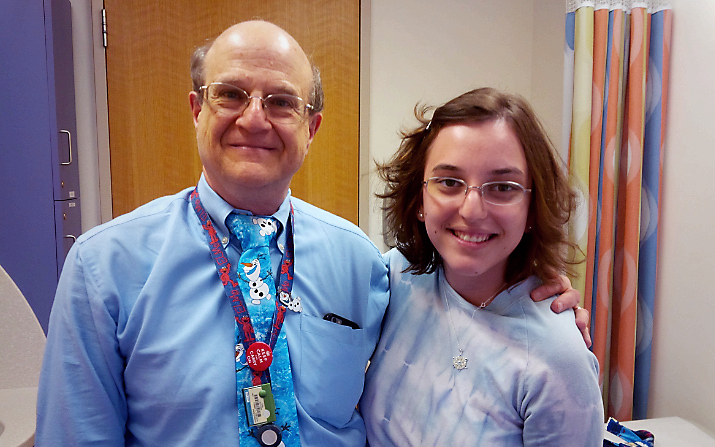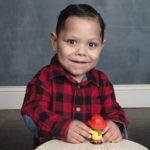‘Never stop looking for answers’: Andrea’s journey with dysmotility

As a volunteer at Caritas Internationalis, Andrea Hernandez loves helping feed the hungry. Yet, until recently, Andrea herself was unable to eat by mouth, instead relying on a feeding tube for nutrition. Nevertheless, she says that when it comes to her health, “We are fed with hope.”
Andrea, now 23, has experienced severe dysmotility problems, as well as short bowel syndrome, since she was born. “She was so sick,” says her mother, Maria. “The doctors in Venezuela didn’t think she would survive — they told us there was nothing they could do for her.”
Unwilling to accept that, Andrea’s parents began contacting hospitals around the world. “We only heard back from two,” says Maria. “One was Boston Children’s Hospital.”
Finally in the right place
When Andrea was just 40 days old, she and her family arrived in Boston. There, they met with Dr. Samuel Nurko, director of Boston Children’s Motility and Functional Gastrointestinal Disorders Center. “When we met Dr. Nurko, we could tell he was a great human being,” says Maria. “He made us feel like we weren’t just in a hospital.”
But Andrea was in the hospital — and would stay there for three months. While Dr. Nurko never stopped giving her family hope that she would improve, he confessed years later that he was worried she wouldn’t make it through the week. Thanks to careful evaluation and around-the-clock care, she slowly began to improve.
Although Andrea’s parents had been told that she also had Hirschsprung’s disease, motility testing revealed that she did not. Instead, she had a host of other motility issues, including fast intestinal transit, which made it difficult for her to absorb nutrients and gain weight.
Listening to families
Over the years, Andrea has faced many ups and downs with her health. Her motility issues stabilized when she was about 6 years old, and she didn’t need to return to Boston for almost eight years. When she returned to Boston, “Dr. Nurko cried even more than we did to see how far I had come,” remembers Andrea.
Maria says she appreciates that Dr. Nurko and his team take her insight into account. “Some doctors can have egos, but Boston Children’s understands that parents know more about their child than anyone and should be involved in their care,” she explains. “They understand that, sick or not, she’s my daughter.”
‘Never give up’
Now, Andrea — who now lives in Spain — travels to Boston every few years to see Dr. Nurko; he is also able to help manage some of her symptoms by phone. When she’s not volunteering and is feeling well, she teaches English. And although she still relies on a feeding tube for nutrition, she is finally able to eat by mouth.
“I want other people to know not to give up. My parents were told I had a one percent chance of survival, but they hung on to that one percent and thanks to that, I’m here,” she says. “Never stop looking for answers and hope.”
Learn more about the Motility and Functional Gastrointestinal Disorders Center.
Related Posts :
-

Dysmotility may play a major role in respiratory symptoms
Clinicians whose patients exhibit respiratory symptoms frequently assume that gastroesophageal reflux disease (GERD) is responsible. However, esophageal and gastric dysmotility ...
-

Taking a leap of faith: Jack says goodbye to his G-tube
As they waited for their son Jack’s appointment, Marika and Josh Reuling had no indication that July 17, 2018, would be ...
-

Doing everything possible for Gabby: A team approach to short bowel syndrome
Gabriel “Gabby” Lopez loves everything hot and spicy. “He will eat a ghost pepper without hesitation,” says his mother, Mayra. “...
-

Six ways to keep kids with aerodigestive disorders healthy
There’s probably not an adult or child who hasn’t experienced the stuffy nose and difficulty swallowing associated with ...





